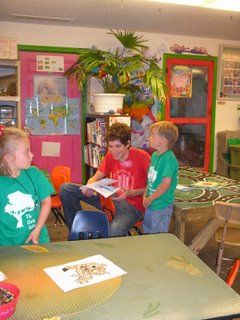
Men make excellent teachers for very young children, but they usually don't think they do. They are shy about little children, and are afraid they won't have anything to say to them. It stops about five seconds into it. Yet give a man a chance, and tell him all the things that he is good at, and if he tries, he will probably add a whole dimension women can't.
Men are naturally rougher with boys, and that's a good thing because we spend too much time trying to get the boys to act like the girls.
One of my dearest young friends is a Marine - 6'4" 225 lbs of mean machine in is size 14 boots. He's a handsome, out going young man who was the gunner in the tank that went in to get Jessica Lynch when the war started. He's also a brilliant teacher for the very young child. His teaching degree is in high school social studies. What a waste. He should be a fourth grade teacher, and could be a preschool teacher with ease. His rapport with very young children is right on target.
So when my teaching staff suggested a young man, Mr. Tom, to help out in the afternoons while he is in college, I said "yes," right away. Tom has been a wonderful addition to the faculty, and the children just love him. He's bright, interested, understands the children and is a first rate colleague. That's Tom in the picture.
I would love to start a daddy day at school for fathers who would be willing to come to school and spend some of a day teaching the kids.
Here's an article about getting men to teach that's worth reading.
Mizzou Launches Effort to Recruit Male Teachers
ALAN SCHER ZAGIER
Associated Press
COLUMBIA, Mo. - After nearly a decade as an elementary school teacher, Steven Cook is a natural.
Off-key renditions of "Head, Shoulders, Knees and Toes" to start the day? No problem. Reading circles and mystery meat-fueled lunch breaks? Piece of cake.
His 20 first-graders at West Boulevard Elementary School know that Mr. Cook is something special. He is also a rarity - the only male classroom teacher in a building otherwise dominated by female authority figures.
Researchers have linked the shortage of male elementary school teachers - only 9 percent nationally, according to the National Education Association - to several detrimental factors, from lower test scores among young boys to the absence of male role models in areas other than sports and entertainment.
The recurring problem has prompted University of Missouri-Columbia education professor Roy Fox to create Men for Excellence in Elementary Teaching, a program he hopes will combine financial incentives with a mentoring network to steer more beginning male teachers to the younger grades.
"I would be sitting at graduation ceremonies and our elementary school teachers would walk by receiving diplomas, one at a time, and I would say, 'Where are the men?'" said Fox, chairman of the College of Education's Department of Learning, Teaching and Curriculum.
"A lot of people recognize it as a problem," he added. "But there's almost complete inertia about it."
The problem is self-perpetuating, said Fox. When boys see few male teachers, they are less likely to consider teaching as a career. In short order, reading, writing and other artistic pursuits lose ground to popular images of men at work and play, he said.
"Instead of seeing men read and write, we see Bruce Willis blowing up a car," said Fox.
Low pay and prestige and a perception that the work is "unmanly" contribute to the shortage of male elementary teachers, he said.
The recruitment program will begin with modest goals by targeting members of the university's Teaching Fellows Program, an accelerated master's degree curriculum for students already certified as teachers but who have yet to hold a full-time teaching job.
Fox hopes to attract just a handful of participants at first and acknowledges that outreach efforts should begin much sooner, ideally at community colleges or even in high school.
"We're starting at the opposite end because we have the fellows' program," he said.
With just 36 men among the more than 400 elementary teachers on payroll, the percentage of male elementary teachers in Columbia mirrors the national average.
Jack Jensen, the Columbia school district's assistant superintendent of elementary education, spent nine years as an elementary teacher before moving into administration. He said the College of Education's effort is sorely needed.
"It's important for our teaching ranks to reflect our community," he said.
Like Jensen, Cook eventually wants to become a principal or school administrator. Already, as West Boulevard's only male classroom teacher, students sometimes view him differently from their other teachers.
"I handle a lot more discipline," he said. "They see females constantly throughout the whole building. Hearing it from me sometimes can make a difference."
As a student at Harris-Stowe State College, Cook said, he was discouraged from taking student teaching positions in younger grades and instead directed toward fifth- and sixth-grade classrooms.
He wonders whether some school administrators and professors also buy into the perceptions that limit the number of men in early childhood education.
"They just assumed that was what we preferred," he said. "If (prospective teachers) get in there with the younger kids, they'd get to know it - and get to love it."

No comments:
Post a Comment